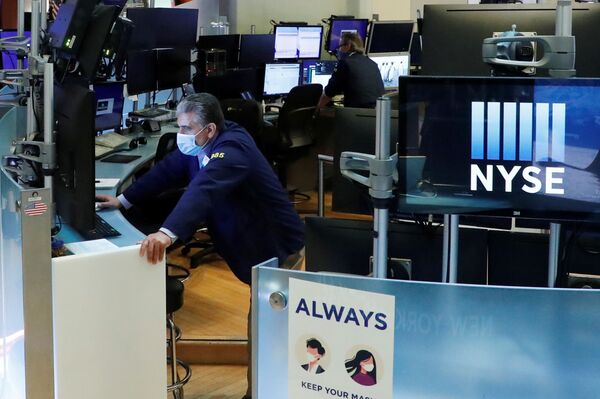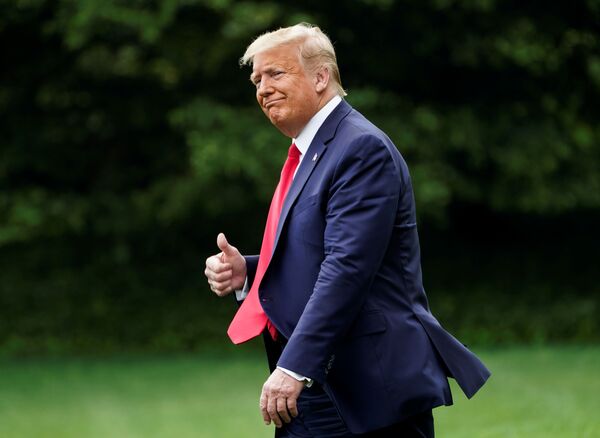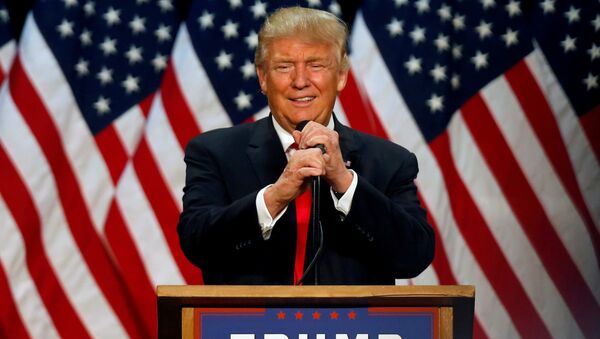Donald Trump’s 2020 election campaign is requiring people to sign a waiver to acknowledge "all risks related to exposure to COVID-19" prior to attending a rally in Tulsa, Oklahoma, reports Business Insider.
"By clicking register below, you are acknowledging that an inherent risk of exposure to COVID-19 exists in any public place where people are present," notes a disclaimer, featured at the bottom of a registration form on Trump's official 2020 campaign website for the rally, to be hosted by the Bank of Oklahoma Center.
According to the Bank of Oklahoma (BOK) Center website, several major events and concerts have had to be canceled due to the coronavirus.
The same waiver adds:
"By attending the Rally, you and any guests voluntarily assume all risks related to exposure to COVID-19 and agree not to hold Donald J. Trump for President, Inc.; BOK Center; ASM Global; or any of their affiliates, directors, officers, employees, agents, contractors, or volunteers liable for any illness or injury."
Earlier, Donald Trump had to cancel several reelection rallies due to restrictions put in place to try and stop the spread of the COVID-19 pandemic.
Grim Coronav
The United States surpassed two million coronavirus cases on 11 June, with the country’s tally exceeding the number of infections reported in any other country.
According to data from the Johns Hopkins University, COVID-19 has killed over 113,000 people across all 50 states.
As the country is moving towards a gradual easing of restrictions over the pandemic, a chorus of expert voices have been urging caution, claiming that amid the reopening of the economy the novel respiratory disease might potentially resurge.
Currently, according to data cited by Associated Press, coronavirus cases are rising in nearly half of all US states, without a specific reason being given for the figures.

According to the outlet, Arizona hospitals were instructed to ready themselves for an influx of patients, Texas registered more hospitalized coronavirus patients than before, while the situation in North Carolina forced the governor to mull a rethink of plans to open schools and businesses.
As the country is swept by a wave of protests and violence sparked by the death of an African American George Floyd, who died in police detention in Minnesota, a spokesperson for the US Centers for Disease Control and Prevention was cited as saying earlier that experts were monitoring "protests and other large gatherings," which "make it difficult to maintain our recommended social distancing guidelines and may put others at risk."
According to current CDC guidelines, "large events and mass gatherings can contribute to the spread of COVID-19".
‘Juneteenth’ Rally
On 10 June President Donald Trump told reporters he will launch a new series of political rallies starting in Oklahoma on 19 June.
"We are going to start our rallies back up… The first one... will be in Oklahoma - in Tulsa, Oklahoma," said the current incumbent of the White House.
Subsequently, Trump promised rallies in Florida, Arizona, and North Carolina.

The Republican National Convention, scheduled for 24-27 August, where the party will officially announce its nominees for president and vice president for the upcoming 2020 presidential election, is to be relocated from North Carolina to a new venue.
Earlier, Joe Biden formally clinched the Democratic presidential nomination, allowing him to face off against the current incumbent, Donald Trump, in the presidential election slated for 3 November 2020.
The Oklahoma rally is imbued with particular meaning amid current developments in the country, as its scheduled for 19 June, also known as Juneteenth, which marks the emancipation of the last remaining enslaved African Americans in the Confederacy at the end of the Civil War.
Texas was the last Confederate State to have the Emancipation Proclamation announced, after the end of the American Civil War in April 1863.
The location of the rally is linked by some with the site of the Tulsa Race Massacre of 1921, when mobs of white Americans attacked black residents and businesses in the Greenwood District of Tulsa, Oklahoma.
The event was dubbed "the single worst incident of racial violence in American history."
The debate revolving around the issue of systemic racism in the US has flared up anew after George Floyd's death on 25 May, when a white police officer held a knee on his neck for nearly nine minutes. The incident was filmed, with the footage going viral and triggering protests across all 50 states and around the globe.


